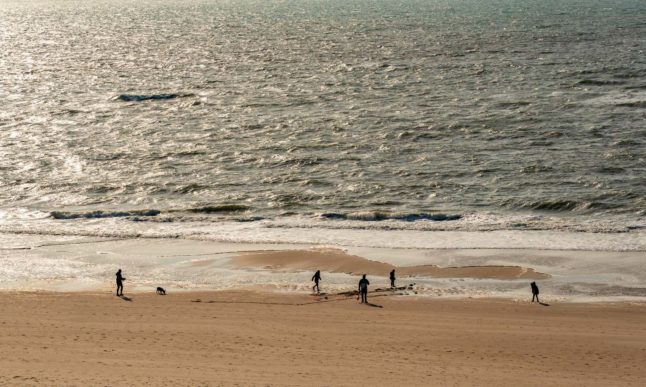For around six months, overnight accommodation in Germany has only been allowed to open for business or essential travellers.
But things are looking up – finally. Some states are taking the first steps towards reopening the tourism sector, allowing people to think about travel.
READ ALSO: When will Germany ease international restrictions on travel?
Germany has two national public holidays coming up – Ascension Day, which is also Father’s Day in Germany, on Thursday May 13th. Then there’s Whitsun holiday on Monday May 24th. Corpus Christi on June 3rd results in a day off for six states, including Bavaria.
What are German states saying at the moment?
Bavaria
On Tuesday, the southern state of Bavaria – a major holiday destination for Germans – announced holidays should be possible in areas with low coronavirus infection rates from Friday May 21st. That’s just in time for Whitsun.
In districts and cities with a stable 7-day incidence of less than 100 Covid infections per 100,000 residents, hotels, holiday apartments and campsites would be allowed to reopen to all guests under the plans.
Outdoor dining, theatres, and cinemas are also to open in the state soon.
Bavaria is especially popular for its picturesque Alpine locations such as Garmisch-Partenkirchen and Berchtesgaden.
READ MORE: Bavaria plans to open for tourists on May 21st
Schleswig-Holstein
Tourism is already starting up again in parts of Schleswig-Holstein, which has the lowest Covid rates in Germany. So-called ‘model’ projects are testing out how tourism can open up step by step.
READ ALSO: Dozens of German districts and cities see major drop in Covid-19 cases
Holidaymakers returned to Sylt – the largest German North Sea island – on Saturday May 1st, as part of the North Frisian tourist model initiative.
Tourism there is ramped up again under strict conditions – and all with the proviso that infections do not increase significantly.
Holidaymakers need a negative coronavirus test upon arrival and have to be re-tested every 48 hours. During the project, restaurants are also allowed to open on Sylt and certain leisure activities, such as hikes and city tours, are also possible.

Enjoying beach life on Sylt. Photo: picture alliance/dpa | Axel Heimken
North Friesland is one of four model tourist regions in Schleswig-Holstein. The projects are to initially last a month with the option of extension. The pilot is already underway in the Schleiregion and Eckernförde, Büsum and the Bay of Lübeck with the popular Timmendorfer Strand on the Baltic Sea to follow.
EXPLAINED: What you need to know about the latest rules on travel to and from Germany
Lower Saxony
In Lower Saxony, too, the first steps in bringing tourism back to life slowly is on the cards. The retail and hospitality sector will begin to open from next week in districts with incidence rates below 100.
All shops will be allowed to open under strict conditions from Monday.
The hospitality sector and hotels will then be able to start gradually opening under strict precautionary rules.
Hotels will be able to open at 60 percent capacity, provided that guests present a negative Covid test on arrival and take new tests every day.
Hotels are initially only allowed to accommodate guests from Lower Saxony. According to the state government in Hanover, two thirds of all districts in Lower Saxony currently have an incidence rate of less than 100. These include many districts from tourist regions along the North Sea coast.
What are the rules right now on travel – and what’s the overall picture?
Across Germany there is no ban on travel. However, as has been the case since November last year, non-essential travel is strongly discouraged.
Germany also recently tightened measures across the country to battle a third wave of Covid-19. In areas where there are more than 100 Covid-19 cases per 100,000 people, restrictions including curfews and tighter contact rules are in place.
But coronavirus infection rates are falling in Germany, and vaccinations are ramping up. This is all good news – and experts hope that the country is on the way to beating the third wave.
READ ALSO: ‘Summer will be good’: Has Germany broken the third wave?
All states will start to open public life further when the infection numbers fall below 100 Covid cases per 100,000 residents in seven days. The hope is that they will continue to drop even more so that other facilities can open.
The federal government’s Tourism Commissioner Thomas Bareiß, of the CDU, said he is “very confident” that widespread travel within Germany will be possible again from June.
“I am very confident that holiday trips with us will be possible in more and more regions from June onwards,” said Bareiß.
He had a bit less hope for travelling over the Whitsun holidays around May 24th. “This will unfortunately fall through again in many holiday regions,” he said.
He told German daily Bild that hotels and restaurants have safety plans in place for when they reopen.
The German government is pushing through new measures which will see fully vaccinated people – and those who’ve recovered from Covid – face fewer restrictions, such as the need to provide a negative Covid test to go shopping or to the hairdresser.
However, there are no plans to open facilities like restaurants and hotels only for these groups.
READ ALSO: ‘Closer to normality’: Germany takes step to ease Covid curbs for vaccinated people



 Please whitelist us to continue reading.
Please whitelist us to continue reading.
Member comments